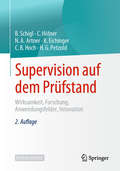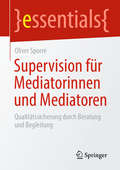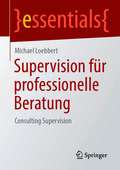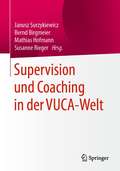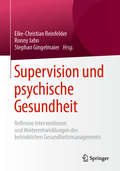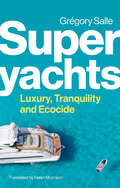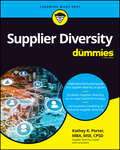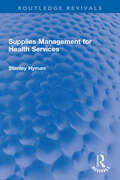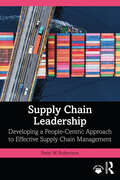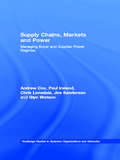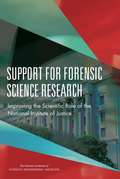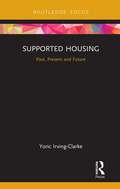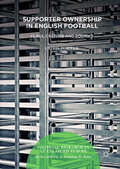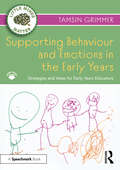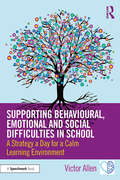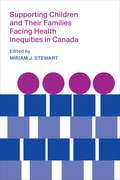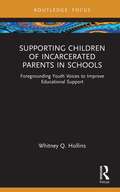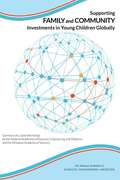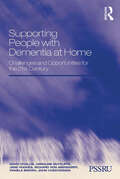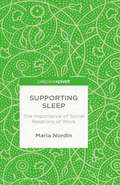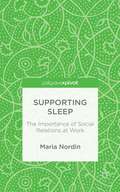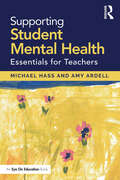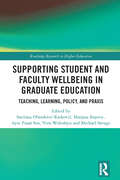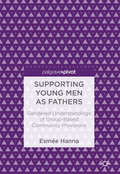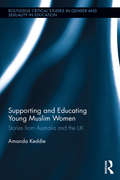- Table View
- List View
Supervision auf dem Prüfstand: Wirksamkeit, Forschung, Anwendungsfelder, Innovation
by Brigitte Schigl Claudia Höfner Noah A. Artner Katja Eichinger Claudia B. Hoch Hilarion G. PetzoldZum ersten Mal wird mit diesem Band die internationale Supervisionsliteratur und der aktuelle Forschungsstand erschlossen, woraus sich Anregungen für die weitere Entwicklung in Theorie, Forschung und Methodik ergeben. In der kritischen Bestandsaufnahme und durch weiterführende Vorschläge für eine künftige Arbeit ist mit diesem Buch ein bedeutender Beitrag für die Entwicklung der Supervision gegeben.
Supervision für Mediatorinnen und Mediatoren: Qualitätssicherung durch Beratung und Begleitung (essentials)
by Oliver SporréSupervision ist ein wichtiger Baustein zur Qualitätssicherung, sowohl in der Ausbildung als auch in der täglichen Arbeit der Mediatoren. Da für die Supervision keine feststehenden Regeln und Abläufe bestehen, gibt es in der Praxis unterschiedliche Erscheinungsformen. Im Mittelpunkt dieses essentials steht die mediationsanaloge Supervision, die Ähnlichkeiten mit den Phasen einer Mediation aufweist und deshalb für Mediatoren gut geeignet ist. Unter Anleitung eines Supervisors entwickeln Mediatoren an einem dargestellten Fall in einer Gruppe Lösungsoptionen für berufliche Fragestellungen und Herausforderungen, die anschließend nach eigener Auswahl und Entscheidung in die Praxis umgesetzt werden können.
Supervision für professionelle Beratung: Consulting Supervision (essentials)
by Michael LoebbertDieses essential ist eine Handreichung für Menschen, die ihre Beratungstätigkeit für ihre Klientinnen und Klienten in der Management- und Organisationsberatung, Sozialberatung, berufliche Beratung und im Coaching noch erfolgreicher gestalten wollen. Es geht um die Verbesserung von Beratung als professionelle Dienstleistung. Konzepte und Methoden der Supervision von kritischen Erfolgsfaktoren und der Psychodynamik von Beratung werden dargestellt.
Supervision und Coaching in der VUCA-Welt
by Janusz Surzykiewicz Bernd Birgmeier Mathias Hofmann Susanne RiegerExperten aus Wissenschaft und Praxis reflektieren im vorliegenden Buch aus unterschiedlichster Perspektive Herausforderungen für Supervision und Coaching in der VUCA-Welt. Der Aspekt des forschenden Lernens und Reflektierens theoriegeleiteter und handlungsrelevanter Konzepte und Methoden dient dabei auch der Förderung einer anwendungsorientierten Forschung und Lehre im akademischen und beruflichen lebenslangen Lernen. Wissenschaft und Praxis wirken gemeinsam zur Profilierung und Professionalisierung von Coaching und Supervision. Die zielorientierte Auseinandersetzung mit der VUCA-Welt im Beratungswesen entfaltet gerade vor dem Hintergrund einer forschungsbegleitenden Praxis und eines humanistischen, ethiksensiblen Menschenbildes eine besondere Note, gibt Impulse für Forschung, Lehre und Praxis. Der Band entstand aus einem gemeinsamen mehrjährigen Austausch und gemeinsamen Bildungskooperations- und Forschungsinteressen zwischen der KU und dem Europäischen Coachingverband EASC. Die Beiträge wurden in einem Kongress mit Wissenschaftlern, Ausbildern und praktisch tätigen Coaches/ Supervisoren diskutiert und dienen unter anderem zur Standardisierung einer Supervisions- und Coachingausbildung sowie als Basis für die Entwicklung eines kooperativen Masterstudiengangs und Zertifikatskurses.
Supervision und psychische Gesundheit: Reflexive Interventionen und Weiterentwicklungen des betrieblichen Gesundheitsmanagements
by Ronny Jahn Eike-Christian Reinfelder Stephan GingelmaierDie Fragen nach Bedingungen psychischer Gesundheit gewinnen in der öffentlichen Debatte zunehmend an Bedeutung. Dies findet z.B. einen Niederschlag in einer wachsenden Akzeptanz betrieblichen Gesundheitspräventionsprogrammen u. Gesundheitsmanagement u.v.a.m. . Der vorliegende Band arbeitet den Nutzen der Beratungsform Supervision für das Feld betrieblicher Prävention und Gesundheitsförderung heraus. Die versammelten Beiträge zeigen, wie Supervision im Kontext betrieblicher Prävention und Gesundheitsförderung systemische, (organisations-)psychologische, soziologische, psycho- und gruppendynamische Ansätze mit klinischen Erkenntnissen zur Beratung bei psychischen Beeinträchtigungen kombiniert. Damit gelingt es dem Band, die gesundheitsförderlichen und präventiven Wirkungen von Supervision in den Fokus zu rücken.
Superyachts: Luxury, Tranquility and Ecocide
by Gregory SalleA superyacht is a boat that exceeds 30 metres in length, with some surpassing even 100 metres—more than a football field. At the beginning of the twenty-first century, there were about 2,000 of these vessels in the world; two decades and a financial crisis later, there are three times as many. Grégory Salle argues that these are not whimsical fads: on the contrary, luxury yachting highlights the social exclusivity of the wealthiest and the environmental waste they emit. Rather than being simply the plaything of billionaires with extravagant lifestyles, the superyacht offers a disconcerting reflection of the world as it is. A contemporary form of ostentatious seclusion, a magnifying glass for social inequalities, the superyacht leads us straight to the great questions of our time, including the question of ecocide. From class struggle to the over-consumption of the rich, from tax evasion to environmental crime, from eco-bleaching to the differential management of illegalities, to pull the thread of super yachting is to unspool the whole ball of capitalism.
Supplier Diversity For Dummies
by Kathey K. PorterExtend the principles of diversity and inclusion to your company's suppliers Many people are familiar with the importance of ensuring and advancing inclusion, equity, and diversity amongst their employees and managers. But do your efforts include supplier diversity—an equally as important and essential part of any holistic diversity effort? In Supplier Diversity For Dummies, nationally recognized small business strategist and economic inclusion and supplier diversity expert Kathey Porter delivers an empowering and informative guide to implementing this integral part of any robust inclusion initiative: supplier diversity. You'll understand the relevance of supplier diversity and why it's important to encourage equal opportunity for diverse suppliers and businesses owned and managed by underrepresented groups. In this book, you'll also find: The answers to your most pressing questions about how to build a coherent and sustainable supplier diversity program Ways to contribute more fully to your company's diversity and inclusion functions Strategies to position supplier diversity as a central function in your organization Perfect for company buyers, purchasing and procurement professionals, material management executives, strategic souring professionals and supplier diversity practitioners, Supplier Diversity For Dummies is a must-read resource for supply chain professionals, diversity and inclusion leaders and anyone looking to increase their proficiency in supplier diversity, improve supply chain inclusivity and increase their social impact.
Supplies Management for Health Services (Routledge Revivals)
by Stanley HymanFirst published in 1979, Supplies Management for Health Services looks at the characteristics and problems of hospital suppliers and examines the way in which the hospital and the National Health Service deal with supplies problems and relations with suppliers. Beginning with a description of the National Health Service and its supplies’ organisations and the role of the Department of Health and Social Security in this field, the book then reports on the detailed studies made over two years of the supplies’ problems of ten London area health authorities and ten London manufacturers of medical equipment. The NHS situation is then contrasted with the supplies’ situation in three non-health organisations and with the health supplies situation in France and West Germany. The final part of the book analyses the information obtained, proposes a means of assessing supplies systems, and evaluates the NHS situation. This is followed by the realistic proposals for reform, advocating a system similar to that used in British defence services, based on a central procurement agency, close cooperation with private manufacturers, and manufacture by government where necessary. This book will surely interest students of economics and global health.
Supply Chain Leadership: Developing a People-Centric Approach to Effective Supply Chain Management
by Peter W. RobertsonSupply chain leaders are key to achieving sustainable supply chain excellence and long-term competitive advantage. This book addresses ‘big-picture’ supply chain leadership and provides a roadmap and practical advice to help supply chain leaders to successfully navigate this challenging social and technical environment. The book describes crucial leadership characteristics and explains the actions necessary to develop and appraise the skills in both new and existing leaders. It presents a socio-technical framework, which includes the key aspects of supply chain relationships, the supply chain business environment, overall supply chain competitiveness, supply chain sustainability, and supply chain risks. The book works through the recruitment, training, and development of leaders as well as obstacles and risks, to offer a fresh, people-centred approach. Pedagogy to aid learning is incorporated throughout, including an introduction to each chapter explaining the key learnings; tables, diagrams, and equations to help visualise the concepts and methods covered; real-life case studies and examples; and end of chapter review questions and assignment tasks. This textbook should be essential reading for advanced undergraduate and postgraduate students of supply chain, logistics, and operations management. The practice-based and applied approach also makes it valuable for operating supply chain leaders and those studying for professional qualifications. Online resources include chapter-by-chapter PowerPoint slides, a test bank of exam questions, and suggested tutorial topics.
Supply Chains, Markets and Power: Managing Buyer and Supplier Power Regimes
by Andrew Cox Paul Ireland Chris Lonsdale Joe Sanderson Glyn WatsonSupply Chains, Markets and Power takes resource-based thinking forward by stressing the need for a dynamic and entrepreneurial conception of resource acquisition and management. This book will be essential reading for all those with a professional or academic interest in supply chain management.
Support for Forensic Science Research: Improving the Scientific Role of the National Institute of Justice
by Committee on Strengthening Forensic Science at the National Institute of JusticeReliable and valid forensic science analytic techniques are critical to a credible, fair, and evidence-based criminal justice system. There is widespread agreement that the scientific foundation of some currently available forensic science methods needs strengthening and that additional, more efficient techniques are urgently needed. These needs can only be met through sustained research programs explicitly designed to ensure and improve the reliability and validity of current methods and to foster the development and use of new and better techniques. This task is challenging due to the broad nature of the field. Concerns have been raised repeatedly about the ability of the criminal justice system to collect and analyze evidence efficiently and to be fair in its verdicts. Although significant progress has been made in some forensic science disciplines, the forensic science community still faces many challenges. Federal leadership, particularly in regard to research and the scientific validation of forensic science methods, is needed to help meet the pressing issues facing state and local jurisdictions. This report reviews the progress made by the National Institute of Justice (NIJ) to advance forensic science research since the 2009 report, Strengthening Forensic Science in the United States: A Path Forward and the 2010 report, Strengthening the National Institute of Justice. Support for Forensic Science Research examines the ways in which NIJ develops its forensic science research priorities and communicates those priorities as well as its findings to the scientific and forensic practitioner communities in order to determine the impact of NIJ forensic science research programs and how that impact can be enhanced.
Supported Housing: Past, Present and Future (Routledge Focus on Housing and Philosophy)
by Yoric Irving-ClarkeThis book covers the history of supported housing provision in the context of the broader political and theoretical considerations of the time in which the respective policies were being implemented. The book takes an historical perspective using path dependency as an analytical framework. Particular attention is paid to the critical junctures in the path of supported housing provision and how these limited and continue to limit the policy choices available. The book concludes with a look at the current state of supported housing policy with a view to making recommendations for how policy in this area could be carried forward. The hope is that readers of this book learn the lessons of previous policy initiatives in this area and, by looking at the philosophical underpinning for supported housing can make recommendations for how it can be funded and provided in the future. This book provides a valuable resource for scholars and practitioners seeking to both provide and influence policy in this area. It is also a useful source for students studying housing and urban policy.
Supporter Ownership in English Football: Class, Culture and Politics (Football Research in an Enlarged Europe)
by Chris PorterThis book presents a fresh perspective on football fandom in England, going beyond existing debates surrounding the structural transformations English football has seen in recent decades, to consider the contested cultural ground upon which football fandom exists. Supporter Ownership in English Football connects cultural conflict experienced across society associated with negotiating structural changes such as globalisation, commodification and social exclusion, with supporter ownership in football – which is in itself an expression and reflection of broader social and political shifts in class-consciousness. Discourses of identity, authenticity, loyalty, ownership and above all, the possibilities and limitations for ordinary people to influence change, play a decisive role in how fans come to decide whether they could, or should, have a meaningful say in the future of their club and the game itself. While celebrating the achievements, progress and potential of the supporter ownership movement, the book is also careful to take account of the various setbacks, contradictions and limiting tendencies that continue to shape its developmental trajectory.Porter’s relation of football supporter ownership to the political and social class dynamics of contemporary society will be of interest to scholars of sport studies, sociology, cultural studies and politics, and those interested in social movements, consumerism, identity, authenticity and community.
Supporting Behaviour and Emotions in the Early Years: Strategies and Ideas for Early Years Educators (Little Minds Matter)
by Tamsin GrimmerHave you ever wondered why children behave the way they do or why they can become overwhelmed with emotions so quickly? This practical resource has been created to help educators effectively support their children’s behaviour and better understand their emotions. The book focuses on the idea that all behaviour is a form of communication and explores central areas such as self-regulation and attachment, offering strategies that can be used to support challenging behaviour. Each chapter includes examples of practice, reflective questions and an activity for the reader to help consolidate their learning and encourage them to become ‘behaviour detectives’. Key topics discussed include: • Attachment theory, adverse childhood experiences and the importance of feeling safe and secure in the home and setting. • Characteristics of children during conflict situations or moments of challenging behaviour. • Developmentally appropriate expectations for children, and why it is vital that expectations are realistic. • Emotion coaching and the significance of acknowledging and validating feelings. • Linking behaviour with schematic play. Written from first-hand experience and filled with practical advice as well as recommendations for further reading and resources, Supporting Behaviour and Emotions in the Early Years is an essential read for early years educators.
Supporting Behavioural, Emotional and Social Difficulties in School: A Strategy a Day for a Calm Learning Environment
by Victor AllenTeachers need to be equipped not only to teach, but also to help build mental security and wellbeing into the lives of young people and children. Supporting Behavioural, Emotional and Social Difficulties in School provides practical, relevant and proven strategies and constructive advice in order to guide teachers in this endeavour, helping them to both understand and overcome the difficulties and generational changes faced by young people and children. Containing information on topics such as classroom strategies for common issues; first impressions; and how to deal with adults, leadership and tasks such as school trips, this volume presents tried and tested strategies and shares the author’s knowledge when it comes to working in all types of schools, including primary, secondary, and pupil referral units. Not only exploring the strategies, this book also examines the reasons why a situation has arisen, and, for each piece of advice, offers an explanation for why it will work and how it affects our sense of coherence. The book also includes a short introduction to brain development at various ages, exploring the implications for children as they grow and mature, as well as examining how teachers can work with and help children through these developmental stages, assisting teachers in understanding the factors to be aware of when helping students and children develop mental security. Consolidating an understanding of mental and emotional health issues within children and young people, knowledge about cognitive brain development, and advice on what teachers can do in their classroom to make a difference, this book is essential reading for all teachers.
Supporting Children and Their Families Facing Health Inequities in Canada
by Miriam J. StewartSupporting Children and Their Families Facing Health Inequities in Canada fills an urgent national need to analyze disparities among vulnerable populations, where socio-economic and cultural factors compromise health and create barriers. Offering solutions and strategies to the prevalent health inequities faced by children, youth, and families in Canada, this book investigates timely issues of social, economic, and cultural significance. Chapters cover a diverse range of socio-economic and cultural factors that contribute to health inequality among the country’s most vulnerable youth populations, including mental health challenges, low income, and refugee status. This book shares scientific evidence from thousands of interviews, questionnaires, surveys, and client consultations, while also providing professional insights that offer key information for at-risk families experiencing health inequities. Timely and transformative, this book will serve as an informed and compassionate guide to promote the health and resiliency of vulnerable children, youth, and families across Canada.
Supporting Children of Incarcerated Parents in Schools: Foregrounding Youth Voices to Improve Educational Support (Routledge Research in Educational Equality and Diversity)
by Whitney Q. HollinsDrawing on qualitative research conducted with young people in New York, this volume highlights the unique experiences of children of incarcerated parents (COIP) and counters deficit-based narratives to consider how young people’s voices can inform and improve educational support services. Supporting Children of Incarcerated Parents in Schools combines the author’s original research and personal experiences with an analysis of existing scholarship to provide unique insight into how COIP experience schooling in the United States. With a focus on the benefits of qualitative research for providing a more nuanced portrayal of these children and their experiences, the text foregrounds youth voices and emphasizes the resilience, maturity, and compassion which these young people demonstrate. By calling attention to the challenges that COIP face in and out of school, and also addressing associated issues around race and racism, the book offers large and small-scale changes that educators and other allies can use to better support children of incarcerated parents. This volume will be of interest to scholars and researchers interested in the sociology of education, race and urban education, and the impacts of parental incarceration specifically. It will also be of benefit to educators and school leaders who are supporting young people affected by these issues.
Supporting Family and Community Investments in Young Children Globally: Summary of a Joint Workshop by the National Academies of Sciences, Engineering, and Medicine and the Ethiopian Academy of Sciences
by Engineering Medicine National Academies of SciencesTo examine the science, policy, and practice surrounding supporting family and community investments in young children globally and children in acute disruptions, the National Academies of Sciences, Engineering, and Medicine held a workshop in partnership with the Ethiopian Academy of Sciences in Addis Ababa, Ethiopia, from July 27-29, 2015. The workshop examined topics related to supporting family and community investments in young children globally. Examples of types of investments included financial and human capital. Participants also discussed how systems can better support children, families, and communities through acute disruptions such as the Ebola outbreak. Over the course of the 3-day workshop, researchers, policy makers, program practitioners, funders, young influencers, and other experts from 19 countries discussed how best to support family and community investments across areas of health, education, nutrition, social protection, and other service domains. This report summarizes the presentations and discussions from the workshop.
Supporting People with Dementia at Home: Challenges and Opportunities for the 21st Century (In Association With Pssru (personal Social Services Research Unit) Ser.)
by John Chesterman Pamela Brown Jane Hughes David Challis Caroline Sutcliffe Richard von AbendorffSupporting People with Dementia at Home details a groundbreaking study of an intensive care management scheme designed for older people with dementia that are at risk of entry into residential care. The authors use a quasi-experimental approach to compare how the individuals on the mental health team in one community were matched to a similar community without the service. They analyze the evidence focusing on the eventual placement of the individual suffering, the quality of care they receive, and also the needs of their carers. This book offers valuable evidence about the factors which can maximize the independence and well being of older people with dementia, from the perspective of older people and their carers. For those who commission services, it is highly relevant to service models for the National Dementia Strategy in England.
Supporting Sleep: The Importance of Social Relations at Work
by M. NordinSocial support and sleep are both health promoting factors and important in the prevention of illness and sick-leave. Promoting healthy work by providing good conditions for strong social relationships and by preventing bullying or harassment can improve sleep and consequently employee health, increasing work productivity and efficiency overall.
Supporting Student Mental Health: Essentials for Teachers
by Michael Hass Amy ArdellSupporting Student Mental Health is a guide to the basics of identifying and supporting students with mental health challenges. It’s no secret that your responsibilities as a teacher go beyond academic achievement. You cover key socioemotional competencies in your classrooms, too. This book is full of accessible and appropriate strategies for responding to students’ mental health needs, such as relationship-building, behavioral observation, questioning techniques, community resources, and more. The authors’ public health, prevention science, and restorative practice perspectives will leave you ready to run a classroom that meets the needs of the whole child while ensuring your own well-being on the job.
Supporting Student and Faculty Wellbeing in Graduate Education: Teaching, Learning, Policy, and Praxis (Routledge Research in Higher Education)
by Michael Savage Mirjana Bajovic Ayse Pinar Sen Vera Woloshyn Snežana Obradović-RatkovićSupporting Student and Faculty Wellbeing in Graduate Education recognizes new pressures impacting graduate students and their supervisors, teachers, and mentors globally. The work provides a range of insights and strategies which reflect on wellbeing as an integral part of teaching, learning, policy, and student-mentor relationships. The authors offer a uniquely holistic approach to supporting the wellbeing of both students and academic staff in graduate education. The text showcases optimized approaches to self-care, self-regulation, and policy development, as well as trauma-informed, arts-based, and embodied pedagogies. Particular attention is given to the challenges faced by minority groups including Indigenous, international, refugee, and immigrant students and staff. Providing a timely analysis of the current issues surrounding student and faculty wellbeing, this volume will appeal to scholars and researchers working across the fields of higher education, sociology of education, educational psychology, and student affairs.
Supporting Young Men as Fathers: Gendered Understandings of Group-Based Community Provisions
by Esmée HannaThis book examines community group settings for young men who are fathers, with particular emphasis on the role of gender within the groups and the possibilities of such groups for the ‘un-doing’ of gender. Young men who are fathers are often marginalized and negatively portrayed within society. Groups allow them space and opportunity for peer support with other young men, to gain confidence and skills, and to positively develop their fatherhood identities. They offer young fathers opportunities to encounter new role models and can therefore help to reimagine young men who are fathers, challenging stereotypes and offering support for young men and their families. Supporting Young Men as Fathers will be of interest to students and scholars in the areas of sociology, social work, health promotion and youth work as well as practitioners working within family settings or who may encounter young men who are parents within their professional roles.
Supporting and Educating Young Muslim Women: Stories from Australia and the UK (Routledge Critical Studies in Gender and Sexuality in Education)
by Amanda KeddieThis book draws on the stories of female educators and young Muslim women to explore issues of identity, justice and education. Situated against a backdrop of unprecedented Islamophobia and new articulations of ‘White-lash’, this book draws on case study research conducted over a ten-year period and provides insight into the diverse worlds of young Muslim women from education and community contexts in Australia and England. Keddie discusses the ways in which these young women find spaces of agency and empowerment within these contexts and how their passionate and committed educators support them in this endeavour. Useful for researchers and educators who are concerned about Islamophobia and its devastating impacts on Muslim women and girls, this book positions responsibility for changing the oppressions of Islamophobia and gendered Islamophobia with all of us. Such change begins with education. The stories in this book hope to contribute to the change process.
